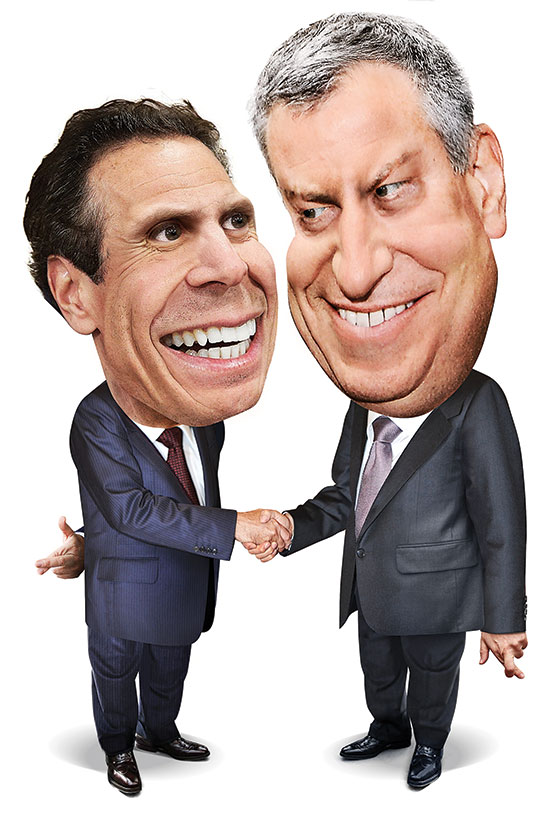 |
Illustration by J. Darrow
(Photo: Spencer Platt/Getty Images (Cuomo); Stephen Lovekin/Getty Images (De Blasio); Kim Jae-Hwan/AFP/Getty Images (Suits)) |
One of the funniest and most revealing moments in Governor Andrew Cuomo’s recent autobiography comes on page 499, in the acknowledgments, and is communicated in his use of punctuation. The governor put the word friends in quotation marks.
This isn’t to suggest that Cuomo has few true personal friends—though after stipulating that friends “should be measured in quality and not quantity,” he does name only two. But in the governor’s line of work, the definition of friends is highly elastic and should usually be interpreted to mean people who are useful—for the moment, anyway.
What’s interesting about Cuomo and Bill de Blasio, though, is that they are genuinely friendly, in the simplest, civilian understanding of the word—which hasn’t stopped them from trying to outmaneuver one another. In fact, familiarity has bred complexity, because both Cuomo and de Blasio think they understand how the other’s mind works.
Cuomo vowed to me, last January, that he would remain pals with the new mayor, whom he’s known and worked with for 20 years. “Bill de Blasio is truly a friend. Not in a political-friend kind of way, you know—a true friend friend,” he said. “I want him to do well. I need him to do well.” But a pattern was quickly established: high-fives, whispered jokes, and effusive professions of kinship in public, followed by scheming behind the scenes.
Almost immediately after de Blasio’s election, Cuomo started ridiculing the mayor’s demand for a tax increase on the rich to pay for expanded pre-kindergarten and after-school programs. Then, in May, de Blasio brokered a last-minute Working Families Party endorsement of the governor’s reelection; Cuomo spent the fall campaign season reneging on his end of the bargain, providing feeble support for the Democratic effort to win a State Senate majority. So de Blasio, to the delight of liberals who’ve been a thorn in Cuomo’s side, pushed his own—ultimately unsuccessful—campaign to defeat Republican legislators.
There were moments of pettiness as well as real policy disagreement, especially when Cuomo blindsided City Hall by decreeing that health workers who aided Ebola patients abroad would be quarantined when arriving at New York’s airports. But what could have turned into a confrontation became a reasonable compromise to ease the quarantine rules and compensate those affected for lost wages. The deal was helped along by their personal bond as well as their pragmatic needs. It will be tough to keep up this act for four more years: de Blasio’s progressive crusade will keep clashing with Cuomo’s centrism, and as 2016 rolls around there may not be enough Democratic spotlight for the both of them. For now, though, the governor and the mayor are expanding the definition of political frenemies in ways that are good for the state and the city, and not just their palhood.